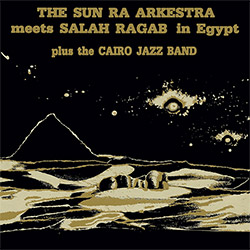
The last installment in Strut's Sun Ra reissue series is also the first time that Sun Ra Arkestra Meets Salah Ragab in Egypt album has been reissued, bringing to light these studio recordings between the Arkestra and Egyptian drummer Salah Ragab, recorded during Ra's 1983 Egyptian tour, and featuring two Ragab compostions from his Cairo Jazz Band.
Out of Stock
Quantity in Basket: None
Log In to use our Wish List
Shipping Weight: 3.00 units
Sample The Album:
Danny Thompson-alto saxophone
Marshall Allen-alto saxophone
Esmat Abbas-bass
Mohey El-Din-bass
Lee Roy Taylor-bass Clarinet
James Jackson-bassoon
Sayed Ramadan-bongos
Salah Ragab-congas
Chris Henderson-drums
Claude Broche-drums
Eric Walker-drums
Salah Ragab-drums
Toto Abdel Hameed-flute
Sun Ra-keyboards
Salah Ragab-percussion
Khamis El-Khouly-piano
Zaky Osman-piccolo flute
El Zammel-saxophone
Saied Aidy-saxophone
Farouk Abdou-saxophone
Fathi Salam-saxophone
Saied Salama-saxophone
John Gilmore-tenor saxophone
Abdel Atie-trombone
Ali Dahroug-trombone
Mahmoud Auoob-trombone
Sadik Basioni-trombone
Tyrone Hill-trombone
Ibrahim Wa Gdy-trumpet
Khalifa Samman-trumpet
Mohamad Abdu-trumpet
Zaky Osman-trumpet
Click an artist name above to see in-stock items for that artist.
UPC: 4062548031171
Label: STRUT
Catalog ID: CD-STRUT-266
Squidco Product Code: 31650
Format: CD
Condition: New
Released: 2022
Country: USA
Packaging: Digipack
Recorded in Egypt in 1983. Originally released in 1983 as a vinyl LP on the Praxis label with catalog code CM 106.
"Strut present the final installment in their series of reissues of Sun Ra's historic recordings in Egypt with The Sun Ra Arkestra meets Salah Ragab in Egypt plus the Cairo Jazz Band, originally released on Greek label Praxis in 1983.
Salah Ragab first encountered the Arkestra at a concert at the house of Goethe Institut ex-pat Hartmut Geerken during the Arkestra's first visit to Cairo and Heliopolis in December 1971 and, although Ra and Ragab did not meet in person on that occasion, they did meet and bond together when Ra returned to Egypt in 1983, resulting in these recordings.
The Arkestra had been touring Europe in March 1983 and made their way to Cairo, playing a number of concerts during April at the Il Capo / Il Buco venue before recording the two superb studio versions of Ragab compositions, 'Egypt Strut' and 'Dawn', at El Nahar Studios in Heliopolis in May, featuring Salah Ragab on congas. Kostas Yiannoulopoulos, organiser of the Praxis festival in Greece, released the recordings as the A-side of this album, with three tracks by Salah Ragab and the Cairo Jazz Orchestra on Side B.
'Ramadan' and 'Oriental Mood' were first heard on the Cairo Jazz Orchestra album Egypt Strut released in 1973 while 'A Farewell Theme', received its very first release on this record, written following the death of Gamal Abdel Nasser in 1970; the piece was played at the much-loved President's funeral. This first ever official reissue of the album features previously unseen photos and memorabilia alongside brand new liner notes by Hartmut Geerken and Paul Griffiths. The album is released in its original artwork and is fully remastered by Technology Works."-Strut
Also available on vinyl LP.Artist Biographies
• Show Bio for Danny Thompson "Baritone saxophonist Danny Thompson, AKA Danny Ray Thompson, was a member of Black Heat, and a regular performed with Sun Ra." ^ Hide Bio for Danny Thompson • Show Bio for Marshall Allen "Marshall Belford Allen (born May 25, 1924) is an American free jazz and avant-garde jazz alto saxophone player. He also performs on flute, oboe, piccolo, and EVI (an electronic valve instrument made by Steiner, Crumar company). Allen is best known for his work with eccentric keyboardist/bandleader Sun Ra, having recorded and performed mostly in this context since the late 1950s, and having led Sun Ra's Arkestra since 1993. Critic Jason Ankeny describes Marshall as "one of the most distinctive and original saxophonists of the postwar era." Marshall Allen was born in Louisville, Kentucky. During the Second World War he enlisted in the 92nd Infantry Division and was stationed in France. Allen studied alto saxophone in Paris and played in Europe with Art Simmons and James Moody. He is best known for his mastery of pyrotechnic effects on the alto - he has said that he "wanted to play on a broader sound basis rather than on chords" (1971 interview with Tam Fiofori cited in). The opportunity came through his long association with Sun Ra, with whom he performed almost exclusively from 1958 to Ra's death in 1993, although he did record outside the Arkestra, notably with Paul Bley's group in 1964 and with Olatunji's group during the mid-1960s. Critic Scott Yanow has described Allen's playing as "Johnny Hodges from another dimension". Since the departure of Sun Ra and John Gilmore, Allen has led the Arkestra, and has recorded two albums as their bandleader. In May 2004, Allen celebrated his 80th birthday on stage with the Arkestra, as part of their performance at the Ninth Vision Festival in New York City. Allen gave another performance on his birthday in 2008 at Sullivan Hall in New York City. Allen often appears in NYC-area collaborations with bassist Henry Grimes and has also participated in the "Outerzone Orchestra" together with Francisco Mora Catlett, Carl Craig and others in an appreciation of Sun Ra's music." ^ Hide Bio for Marshall Allen • Show Bio for Salah Ragab "Salah Ragab (Arabic: صلاح رجب) was an Egyptian drummer. While serving as a major in the Egyptian army, Ragab tried to form a jazz band with American saxophonist Mac X. Spears in the early 1960s, but Spears left the country soon after its inception. At a concert by Randy Sexton, Ragab befriended Hartmut Geerken and Eduard Vizvari, and they started the Cairo Jazz Band. In his work for the military's department of music Ragab selected musicians to join the big band and taught them jazz. The Cairo Jazz Band performed for the first time at American University in 1969, performing original works in addition to music by Count Basie and Dizzy Gillespie, then in Alexandria and Cairo. The band recorded in the early 1970s. Geerken invited Sun Ra, who made a few visits to Egypt. Ragab performed with Ra in 1971 and 1983. Ra recorded two of Ragab's songs: "Dawn" and "Egypt Strut". Ragab also briefly with the German band Embryo." ^ Hide Bio for Salah Ragab • Show Bio for Salah Ragab "Salah Ragab (Arabic: صلاح رجب) was an Egyptian drummer. While serving as a major in the Egyptian army, Ragab tried to form a jazz band with American saxophonist Mac X. Spears in the early 1960s, but Spears left the country soon after its inception. At a concert by Randy Sexton, Ragab befriended Hartmut Geerken and Eduard Vizvari, and they started the Cairo Jazz Band. In his work for the military's department of music Ragab selected musicians to join the big band and taught them jazz. The Cairo Jazz Band performed for the first time at American University in 1969, performing original works in addition to music by Count Basie and Dizzy Gillespie, then in Alexandria and Cairo. The band recorded in the early 1970s. Geerken invited Sun Ra, who made a few visits to Egypt. Ragab performed with Ra in 1971 and 1983. Ra recorded two of Ragab's songs: "Dawn" and "Egypt Strut". Ragab also briefly with the German band Embryo." ^ Hide Bio for Salah Ragab • Show Bio for Sun Ra "Sun Ra (born Herman Poole Blount, legal name Le Sony'r Ra; May 22, 1914 - May 30, 1993) was an American jazz composer, bandleader, piano and synthesizer player, poet and philosopher known for his experimental music, "cosmic philosophy", prolific output, and theatrical performances. He was inducted into the Alabama Jazz Hall of Fame in 1979. For much of his career, Ra led "The Arkestra", an ensemble with an ever-changing name and flexible line-up. Born and raised in Alabama, Blount would eventually become involved in the 1940s Chicago jazz scene. He soon abandoned his birth name, taking the name Sun Ra (after Ra, the Egyptian God of the Sun) and developing a complex persona and mythology that would make him a pioneer of Afrofuturism: he claimed he was an alien from Saturn on a mission to preach peace, and throughout his life he consistently denied any ties to his prior identity. His widely eclectic and exploratory music would eventually touch on virtually the entire history of jazz, ranging from swing music and bebop to free jazz and fusion, and his compositions ranged from keyboard solos to big bands of over 30 musicians. From the mid-1950s until his death, Ra led the musical collective The Arkestra (which featured artists such as Marshall Allen, John Gilmore, June Tyson throughout its various iterations). Its performances often included dancers and musicians dressed in elaborate, futuristic costumes inspired by ancient Egyptian attire and the space age. Though his mainstream success was limited, Sun Ra was a prolific recording artist and frequent live performer, and remained both influential and controversial throughout his life for his music and persona. He is now widely considered an innovator; among his distinctions are his pioneering work in free improvisation and modal jazz and his early use of electronic keyboards. Over the course of his career, he recorded dozens of singles and over one hundred full-length albums, comprising well over 1000 songs, and making him one of the most prolific recording artists of the 20th century. Following Sun Ra's death in 1993, the Arkestra continues to perform." ^ Hide Bio for Sun Ra • Show Bio for Salah Ragab "Salah Ragab (Arabic: صلاح رجب) was an Egyptian drummer. While serving as a major in the Egyptian army, Ragab tried to form a jazz band with American saxophonist Mac X. Spears in the early 1960s, but Spears left the country soon after its inception. At a concert by Randy Sexton, Ragab befriended Hartmut Geerken and Eduard Vizvari, and they started the Cairo Jazz Band. In his work for the military's department of music Ragab selected musicians to join the big band and taught them jazz. The Cairo Jazz Band performed for the first time at American University in 1969, performing original works in addition to music by Count Basie and Dizzy Gillespie, then in Alexandria and Cairo. The band recorded in the early 1970s. Geerken invited Sun Ra, who made a few visits to Egypt. Ragab performed with Ra in 1971 and 1983. Ra recorded two of Ragab's songs: "Dawn" and "Egypt Strut". Ragab also briefly with the German band Embryo." ^ Hide Bio for Salah Ragab • Show Bio for John Gilmore "John Gilmore (September 28, 1931 – August 19, 1995) was an avant-garde jazz saxophonist known for his tenure with keyboardist/bandleader Sun Ra from the 1950s to the 1990s. Gilmore grew up in Chicago and played clarinet from the age of 14. He took up the tenor saxophone while serving in the United States Air Force from 1948 to 1952, then pursued a musical career, playing briefly with pianist Earl Hines before encountering Sun Ra in 1953. For the next four decades, Gilmore recorded and performed almost exclusively with Sun Ra. This was puzzling to some, who noted Gilmore's talent, and thought he could be a major star like John Coltrane or Sonny Rollins. Despite being five years older than Gilmore, Coltrane was impressed with his playing, and took informal lessons from Gilmore in the late 1950s. Coltrane's epochal, proto–free jazz "Chasin' the Trane" was inspired partly by Gilmore's sound. In 1957 he co-led with Clifford Jordan a Blue Note date that is regarded as a hard bop classic: Blowing In from Chicago. Horace Silver, Curly Russell, and Art Blakey provided the rhythm section. In the mid-1960s Gilmore toured with the Jazz Messengers and he participated in recording sessions with Paul Bley, Andrew Hill (Andrew! and Compulsion), Pete La Roca (Turkish Women at the Bath), McCoy Tyner (Today and Tomorrow) and a handful of others. In 1970 he co-led a recording with Jamaican trumpeter Dizzy Reece. His main focus throughout, however, remained with the Sun Ra Arkestra. Gilmore's devotion to Sun Ra was due, in part, to the latter's use of harmony, which Gilmore considered both unique and a logical extension of bebop. Gilmore had stated that Sun Ra was "more stretched out than Monk" and that "I'm not gonna run across anybody who's moving as fast as Sun Ra ... So I just stay where I am." Gilmore occasionally doubled on drums and also played bass clarinet until Sun Ra hired Robert Cummings as a specialist on the latter instrument in the mid-1950s. However, tenor sax was his main instrument and Gilmore himself made a huge contribution to Sun Ra's recordings and was the Arkestra's leading sideman, being given solos on almost every track on which he appeared. In the Rough Guide to Jazz, Brian Priestley says: Many fans of jazz saxophone consider him to be among the greatest ever, his fame shrouded in the relative anonymity of being a member of Sun Ra's Arkestra. His "straight ahead post-bop" talents are exemplified in his solo on the Arkestra's rendition of "Blue Lou," as seen on Mystery, Mr. Ra. After Sun Ra's 1993 death, Gilmore led Ra's Arkestra for a few years before his own death from emphysema. Marshall Allen then took over the Arkestra leadership." ^ Hide Bio for John Gilmore • Show Bio for Tyrone Hill "Trombonist Tyrone Hill remains best remembered for a three-decade stint as a member of cosmic jazz pioneer Sun Ra's Arkestra. Born in north Philadelphia in 1949, Hill first played the trombone in his middle school band. A neighbor of fledgling jazz greats including John Coltrane, Odean Pope, and Middie Middleton, he also harmonized in a local doo wop group. After four years studying trombone at the Combs School of Music, Hill tenured with the Uptown Theatre Orchestra, supporting headliners ranging from Smokey Robinson & the Miracles to James Brown. In 1969, he auditioned for Sun Ra but played only a handful of dates with the Arkestra before joining Philly soul hitmaker Billy Paul in 1971. Hill spent eight years touring and recording as Paul's musical director before returning to Philadelphia to rejoin the Arkestra on a permanent basis. In the years to follow, he played on more than three dozen Sun Ra LPs, and continued with the group following its founder's 1993 final departure from the terrestrial plane. In 1997 Hill recorded his first solo date, Out of the Box, for the Creative Improvised Music Projects label; a sequel, Soul-Etude, followed two years later. Hill left the planet on March 11, 2007, at the age of 58."-Jason Ankeny, All Music ^ Hide Bio for Tyrone Hill
Have a better biography or biography source? Please Contact Us so that we can update this biography.
11/20/2024
Have a better biography or biography source? Please Contact Us so that we can update this biography.
11/20/2024
Have a better biography or biography source? Please Contact Us so that we can update this biography.
11/20/2024
Have a better biography or biography source? Please Contact Us so that we can update this biography.
11/20/2024
Have a better biography or biography source? Please Contact Us so that we can update this biography.
11/20/2024
Have a better biography or biography source? Please Contact Us so that we can update this biography.
Gilmore is known for two rather different styles of tenor playing. On performances of a straight ahead post-bop character (which include many of those with Sun Ra), he runs the changes with a fluency and tone halfway between Johnny Griffin and Wardell Gray, and with a rhythmic and motivic approach which he claims influenced Coltrane. On more abstract material, he is capable of long passages based exclusively on high-register squeals. Especially when heard live, Gilmore was one of the few musicians who carried sufficient conviction to encompass both approaches.
11/20/2024
Have a better biography or biography source? Please Contact Us so that we can update this biography.
11/20/2024
Have a better biography or biography source? Please Contact Us so that we can update this biography.
Track Listing:
1. Egypt Strut 6:40
2. Dawn 12:15
3. Ramadan 4:20
4. Oriental Mood 4:50
5. A Farewell Theme 10:06
Improvised Music
Jazz
Free Improvisation
Sun Ra
Jazz Reissues
New in Improvised Music
Friends of Squid
Search for other titles on the label:
STRUT.


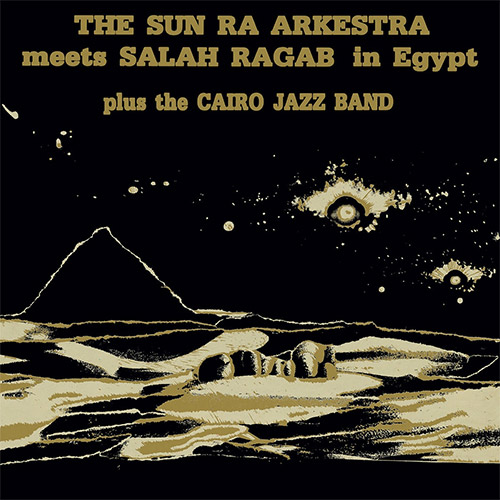

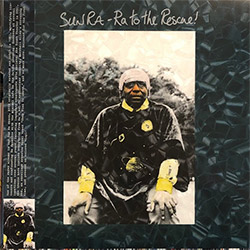

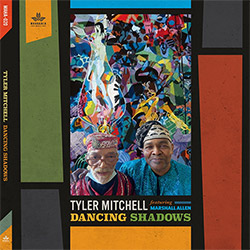

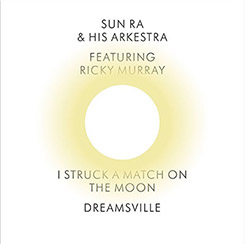
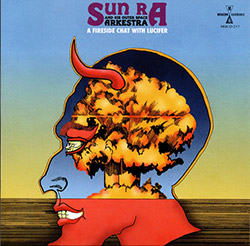
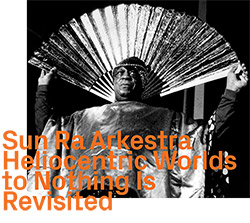




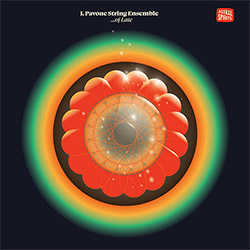
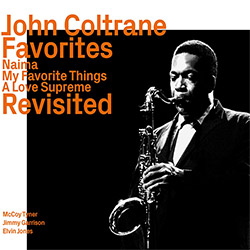







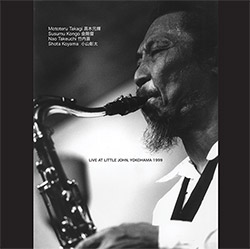

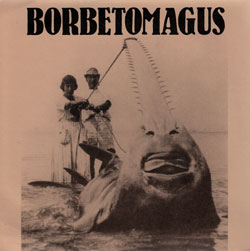


![Guy, Barry / Ken Vandermark: Occasional Poems [2 CDs]](https://www.teuthida.com/productImages/misc4/34849.jpg)
![Novoa / Carter / Mela Trio: Vol.1 [VINYL]](https://www.teuthida.com/productImages/misc4/35236.jpg)


![Elephant9 : Mythical River [VINYL]](https://www.teuthida.com/productImages/misc4/34624.jpg)
![Evans, Peter (Evans / Eldh / Black): Extra [VINYL]](https://www.teuthida.com/productImages/misc4/35279.jpg)

![McPhee, Joe: Straight Up, Without Wings [BOOK]](https://www.teuthida.com/productImages/misc4/35454.jpg)
![Jeck, Philip: rpm [2 CDs]](https://www.teuthida.com/productImages/misc4/35455.jpg)













![Barker / Parker / Irabagon: Bakunawa [VINYL]](https://www.teuthida.com/productImages/misc4/35533.jpg)
![Blaser, Samuel / Marc Ducret / Peter Bruun: Dark Was The Night, Cold Was The Ground [VINYL 10-inch]](https://www.teuthida.com/productImages/misc4/35492.jpg)








![Warren, Kenny (Warren / Hoffman / Ellman): Sweet World [VINYL]](https://www.teuthida.com/productImages/misc4/35451.jpg)




![Blake, Ran / Dave Knife Fabris: Live Amsterdam 2006, First Visit [CD + POSTCARDS]](https://www.teuthida.com/productImages/misc4/35275.jpg)













![DNS: Taking Big Bites Of The Khandas Three Cafes Deep [2 CDs]](https://www.teuthida.com/productImages/misc4/35334.jpg)




![Cleaver, Gerald: The Process [VINYL]](https://www.teuthida.com/productImages/misc4/34966.jpg)




![Alva Noto: HYbr:ID II [VINYL 2 LPs]](https://www.teuthida.com/productImages/misc4/35201.jpg)

![Baron, Derek / Luke Martin: Distinct and Concealed [CASSETTE + DOWNLOAD]](https://www.teuthida.com/productImages/misc4/35079.jpg)

![Lyle, Erica Dawn : Colonial Motels [CASSETTE + DOWNLOAD]](https://www.teuthida.com/productImages/misc4/35080.jpg)









![Sanna, Claudio: Compositori Sardi Contemporanei II [2 CDs]](https://www.teuthida.com/productImages/misc4/35317.jpg)







![Zurria, Manuel: Fame di Vento [3 CDs]](https://www.teuthida.com/productImages/misc4/35167.jpg)

![Granberg, Magnus / Nattens Inbrott / Skogen: Holde Traume, Kehret Wieder! [2 CDs]](https://www.teuthida.com/productImages/misc4/35038.jpg)
![Frey, Jurg: Outermost Melodie [2 CDs]](https://www.teuthida.com/productImages/misc4/35039.jpg)

![Pavone, Jessica: Reverse Bloom [VINYL]](https://www.teuthida.com/productImages/misc4/34895.jpg)




![Modney (Modney / Wooley / Gentile / Roberts / Pluta / Symthe / ...): Ascending Primes [2 CDs]](https://www.teuthida.com/productImages/misc4/34852.jpg)









![Elephant9 with Terje Rypdal: Catching Fire [VINYL 2 LPs]](https://www.teuthida.com/productImages/misc4/35355.jpg)
![Deerlady (Obomsawin, Mali / Magdalena Abrego): Greatest Hits [VINYL]](https://www.teuthida.com/productImages/misc4/34876.jpg)




![Haino, Keiji: Black Blues [2 CDs]](https://www.teuthida.com/productImages/misc4/35109.jpg)



![Surplus 1980: Illusion of Consistency [CD]](https://www.teuthida.com/productImages/misc4/35069.jpg)
![Staiano, Moe: Away Towards the Light [VINYL + DOWNLOAD]](https://www.teuthida.com/productImages/misc4/35037.jpg)



![Caveira (Gomes / Sousa / Abras / Ferrandini): Ficar Vivo [VINYL]](https://www.teuthida.com/productImages/misc4/34643.jpg)
![Gregg, J. J. / David Van Auken: Lunar Prairie [CD w/ DOWNLOAD]](https://www.teuthida.com/productImages/misc4/34611.jpg)

![Coultrain: Mundus [VINYL]](https://www.teuthida.com/productImages/misc4/32439.jpg)
![Mattin: Songbook #6 [VINYL]](https://www.teuthida.com/productImages/misc4/27317.jpg)
![Punkappella: Wake Up [7-inch VINYL]](https://www.teuthida.com/productImages/misc4/17519.jpg)
![Residents, The: WARNING: UNiNC.: Live And Experimental Recordings 1971-1972 [VINYL 2 LPs]](https://www.teuthida.com/productImages/misc4/31521.jpg)
![Coultrain: Phantasmagoria [VINYL]](https://www.teuthida.com/productImages/misc4/30142.jpg)
![Lennon, Sean Ono: Asterisms [VINYL]](https://www.teuthida.com/productImages/misc4/34517.jpg)

![Coley, Byron: Dating Tips for Touring Bands [VINYL]](https://www.teuthida.com/productImages/misc4/17906.jpg)

![Lost Kisses: My Life is Sad & Funny [DVD]](https://www.teuthida.com/productImages/misc4/lostKissesDVD.jpg)